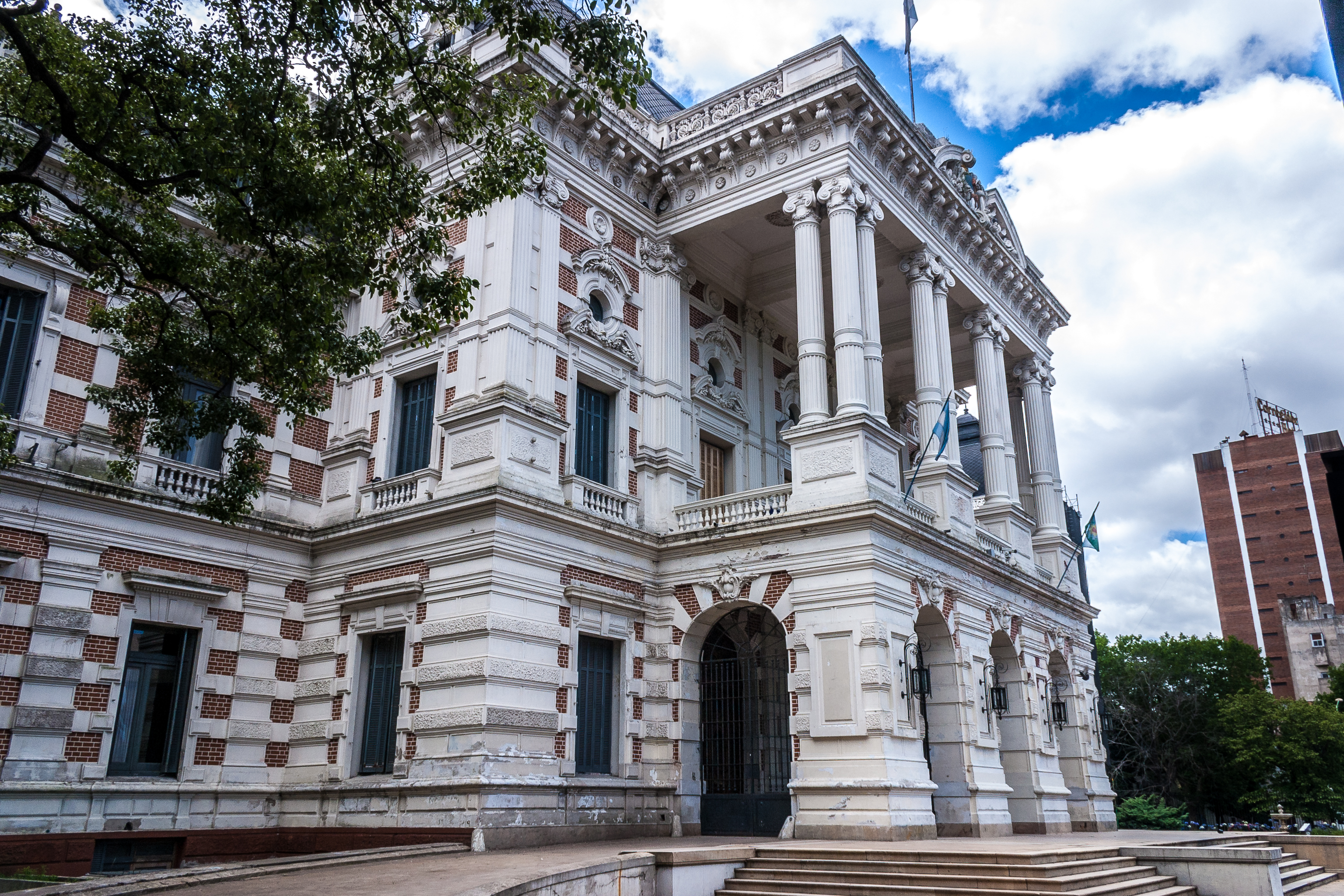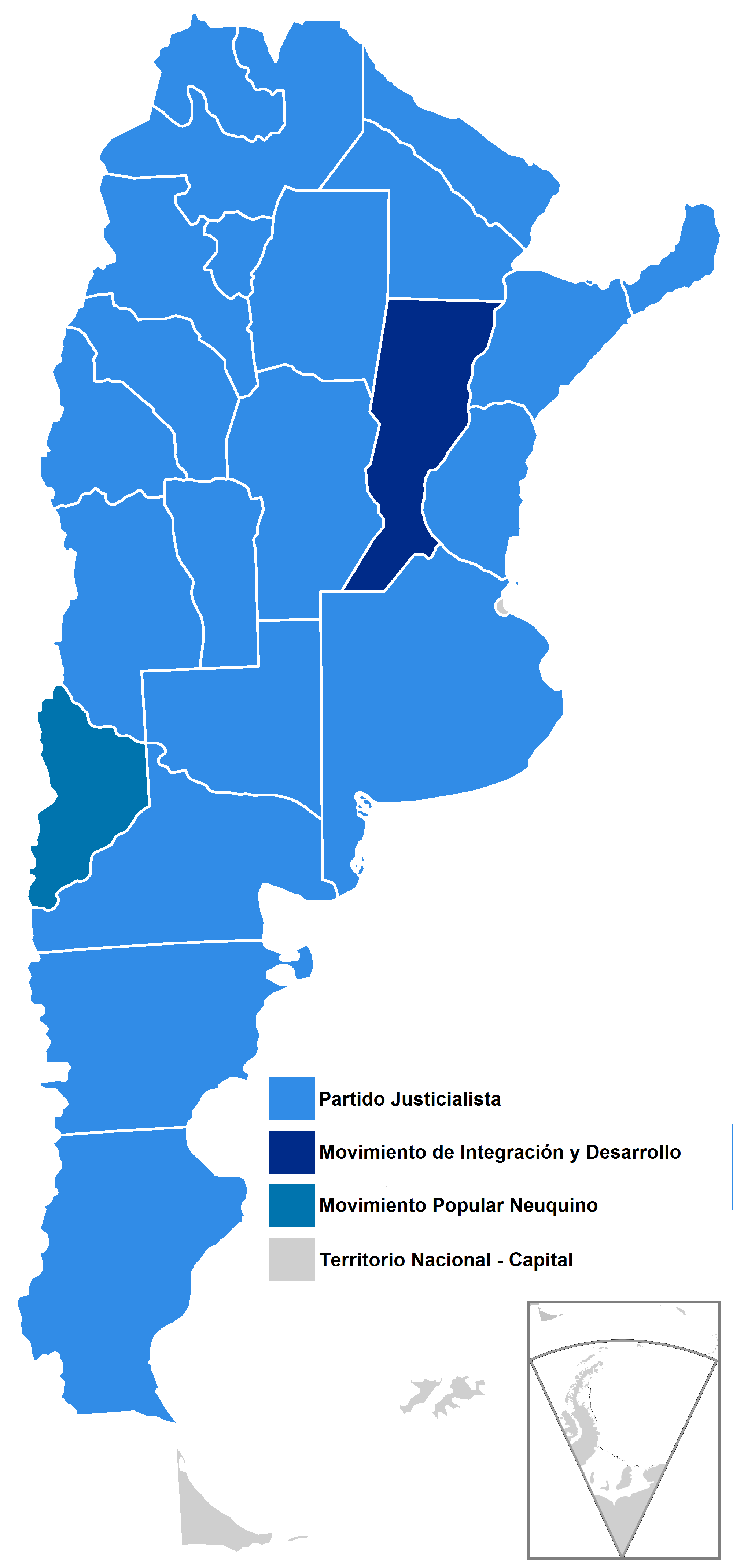|
Oscar Alende
Oscar Eduardo Alende (6 July 1909 – 22 December 1996) was an Argentine politician who founded the Intransigent Party. Alende was born in Maipú, Buenos Aires Province. He studied medicine at the University of La Plata, where he led the student union, and completed his medical studies at the University of Buenos Aires in 1933. He became head of gastro-intestinal surgery at Rawson Hospital, and a member of the Argentine Surgical Academy. He was co-founder of the Argentine Committee of Assistance to Republican Spain. In 1948 Alende became a provincial legislator in Buenos Aires Province for the Radical Civic Union (UCR), heading the UCR block from 1950. In 1952 he became a deputy in the Argentine Chamber of Deputies, serving until its dissolution in 1955. Alende had joined the breakaway Intransigent Radical Civic Union (UCRI). In 1958 he was elected Governor of Buenos Aires Province and served until 1962. Alende became the leader of the UCRI following the 1962 overthrow of P ... [...More Info...] [...Related Items...] OR: [Wikipedia] [Google] [Baidu] |
Governor Of Buenos Aires Province
The Governor of Buenos Aires Province () is a citizen of the Buenos Aires Province of Argentina, holding the office of governor for the corresponding period. The governor is elected alongside a vice-governor. Currently the governor of Buenos Aires Province is Axel Kicillof since December 11, 2019. Requirements To be able to be elected governor, the person must be an Argentine citizen and must have been born in Argentina, or be the child of an Argentine citizen if born in a foreign country.Constitución de la Provincia de Buenos Aires - Art- 121 The citizen must also be at least 30 years old, and have at least 5 uninterrupted years of residence in the province if not natural from it. The term lasts 4 years, with the chance of a single reelection. List of o ...
|
March 1973 Argentine General Election
The first Argentine general election of 1973 was held on 11 March. Voters chose both the President and their legislators. Background The 1966 coup d'état against the moderate President Arturo Illia was carried out largely as a reaction to Illia's decision to honor local and legislative elections in which Peronists, officially banned from political activity following the violent overthrow of President Juan Perón in 1955, did well. Five years later, however, President Alejandro Lanusse found himself heading an unpopular junta, saddled by increasing political violence and an economic wind-down from the prosperous 1960s. Seizing the initiative, he gathered leaders from across the nation's political and intellectual spectrum for a July 1971 ''asado'', a time-honored Argentine custom as much about camaraderie as about steak. The result was Lanusse's "Great National Agreement," a road map to the return to democratic rule, including Peronists (the first such concession the mili ... [...More Info...] [...Related Items...] OR: [Wikipedia] [Google] [Baidu] |
Members Of The Argentine Chamber Of Deputies Elected In Buenos Aires Province
Member may refer to: * Military jury, referred to as "Members" in military jargon * Element (mathematics), an object that belongs to a mathematical set * In object-oriented programming, a member of a class ** Field (computer science), entries in a database ** Member variable, a variable that is associated with a specific object * Limb (anatomy), an appendage of the human or animal body ** Euphemism for penis * Structural component of a truss, connected by nodes * User (computing), a person making use of a computing service, especially on the Internet * Member (geology), a component of a geological formation * Member of parliament * The Members, a British punk rock band * Meronymy, a semantic relationship in linguistics * Church membership, belonging to a local Christian congregation, a Christian denomination and the universal Church * Member, a participant in a club or learned society A learned society ( ; also scholarly, intellectual, or academic society) is an organizati ... [...More Info...] [...Related Items...] OR: [Wikipedia] [Google] [Baidu] |
Governors Of Buenos Aires Province
A governor is an administrative leader and head of a polity or political region, in some cases, such as governors-general, as the head of a state's official representative. Depending on the type of political region or polity, a ''governor'' may be either appointed or elected, and the governor's powers can vary significantly, depending on the public laws in place locally. The adjective pertaining to a governor is gubernatorial, from the Latin root ''gubernare''. In a federated state, the governor may serve as head of state and head of government for their regional polity, while still operating under the laws of the federation, which has its own head of state for the entire federation. Ancient empires Pre-Roman empires Though the legal and administrative framework of provinces, each administered by a governor, was created by the Romans, the term ''governor'' has been a convenient term for historians to describe similar systems in antiquity. Indeed, many regions of the pre-Roman a ... [...More Info...] [...Related Items...] OR: [Wikipedia] [Google] [Baidu] |
Argentine Surgeons
Argentines, Argentinians or Argentineans are people from Argentina. This connection may be residential, legal, historical, or cultural. For most Argentines, several (or all) of these connections exist and are collectively the source of their being Argentine. Argentina is a multiethnic society, multiethnic society, home to people of various Ethnicity, ethnic, Race (human categorization), racial, Religion, religious, Religious denomination, denomination, and Nationality, national origins, with the majority of the population made up of Old World immigrants and their descendants. As a result, Argentines do not equate their nationality with ethnicity, but with citizenship and allegiance to Argentina. Aside from the indigenous population, nearly all Argentines or their ancestors immigrated within the past five centuries. Among countries in the world that have received the most immigrants in modern history, Argentina, with 6.6 million, ranks second to the United States (27 million), ... [...More Info...] [...Related Items...] OR: [Wikipedia] [Google] [Baidu] |
University Of Buenos Aires Alumni
A university () is an institution of tertiary education and research which awards academic degrees in several academic disciplines. ''University'' is derived from the Latin phrase , which roughly means "community of teachers and scholars". Universities typically offer both undergraduate and postgraduate programs. The first universities in Europe were established by Catholic monks. The University of Bologna (), Italy, which was founded in 1088, is the first university in the sense of: *being a high degree-awarding institute. *using the word (which was coined at its foundation). *having independence from the ecclesiastic schools and issuing secular as well as non-secular degrees (with teaching conducted by both clergy and non-clergy): grammar, rhetoric, logic, theology, canon law and notarial law.Hunt Janin: "The university in medieval life, 1179–1499", McFarland, 2008, , p. 55f.de Ridder-Symoens, Hilde''A History of the University in Europe: Volume 1, Universities in the Middl ... [...More Info...] [...Related Items...] OR: [Wikipedia] [Google] [Baidu] |
Radical Civic Union Politicians
Radical (from Latin: ', root) may refer to: Politics and ideology Politics *Classical radicalism, the Radical Movement that began in late 18th century Britain and spread to continental Europe and Latin America in the 19th century *Radical politics, the political intent of fundamental societal change *Radical Party (other), several political parties *Radicals (UK), a British and Irish grouping in the early to mid-19th century *Radicalization *Politicians from the Radical Civic Union Ideologies *Radical chic, a term coined by Tom Wolfe to describe the pretentious adoption of radical causes *Radical feminism, a perspective within feminism that focuses on patriarchy *Radical Islam, or Islamic extremism *Radical Christianity *Radical veganism, a radical interpretation of veganism, usually combined with anarchism *Radical Reformation, an Anabaptist movement concurrent with the Protestant Reformation Science and mathematics Science *Radical (chemistry), an atom, molecule, or ion ... [...More Info...] [...Related Items...] OR: [Wikipedia] [Google] [Baidu] |
Argentine People Of Galician Descent
Argentines, Argentinians or Argentineans are people from Argentina. This connection may be residential, legal, historical, or cultural. For most Argentines, several (or all) of these connections exist and are collectively the source of their being Argentine. Argentina is a multiethnic society, multiethnic society, home to people of various Ethnicity, ethnic, Race (human categorization), racial, Religion, religious, Religious denomination, denomination, and Nationality, national origins, with the majority of the population made up of Old World immigrants and their descendants. As a result, Argentines do not equate their nationality with ethnicity, but with citizenship and allegiance to Argentina. Aside from the indigenous population, nearly all Argentines or their ancestors immigrated within the past five centuries. Among countries in the world that have received the most immigrants in modern history, Argentina, with 6.6 million, ranks second to the United States (27 million), ... [...More Info...] [...Related Items...] OR: [Wikipedia] [Google] [Baidu] |
1996 Deaths
This is a list of lists of deaths of notable people, organized by year. New deaths articles are added to their respective month (e.g., Deaths in ) and then linked below. 2025 2024 2023 2022 2021 2020 2019 2018 2017 2016 2015 2014 2013 2012 2011 2010 2009 2008 2007 2006 2005 2004 2003 2002 2001 2000 1999 1998 1997 1996 1995 1994 1993 1992 1991 1990 1989 1988 1987 1986 Earlier years ''Deaths in years earlier than this can usually be found in the main articles of the years.'' See also * Lists of deaths by day * Deaths by year (category) {{DEFAULTSORT:deaths by year ... [...More Info...] [...Related Items...] OR: [Wikipedia] [Google] [Baidu] |
1909 Births
Events January–February * January 4 – Explorer Aeneas Mackintosh of the Imperial Trans-Antarctic Expedition escapes death by fleeing across drift ice, ice floes. * January 7 – Colombia recognizes the independence of Panama. * January 9 – The British Nimrod Expedition, ''Nimrod'' Expedition to the South Pole, led by Ernest Shackleton, arrives at the Farthest South, farthest south reached by any prior expedition, at 88°23' S, prior to turning back due to diminishing supplies. * January 11 – The International Joint Commission on US-Canada boundary waters is established. * January 16 – Members of the ''Nimrod'' Expedition claim to have found the magnetic South Pole (but the location recorded may be incorrect). * January 24 – The White Star Liner RMS Republic (1903), RMS ''Republic'' sinks the day after a collision with ''SS Florida'' off Nantucket. Almost all of the 1,500 passengers are rescued. * January 28 – The last United States t ... [...More Info...] [...Related Items...] OR: [Wikipedia] [Google] [Baidu] |
Jorge Bermudez Emparanza
Jorge is the Spanish and Portuguese form of the given name George. While spelled alike, this name is pronounced very differently in each of the two languages: Spanish ; Portuguese . It is derived from the Greek name Γεώργιος (''Georgios'') via Latin ''Georgius''; the former is derived from (''georgos''), meaning "farmer" or "earth-worker". The Latin form ''Georgius'' had been rarely given in Western Christendom since at least the 6th century. The popularity of the name however develops from around the 12th century, in Occitan in the form '' Jordi'', and it becomes popular at European courts after the publication of the ''Golden Legend'' in the 1260s. The West Iberian form ''Jorge'' is on record in Portugal as the name of Jorge de Lencastre, Duke of Coimbra (1481–1550). List of people with the given name Jorge * Jorge (footballer, born 1939), Brazilian footballer * Jorge (footballer, born 1946), Brazilian footballer * Jorge (Brazilian singer), Brazilian musician and ... [...More Info...] [...Related Items...] OR: [Wikipedia] [Google] [Baidu] |
Emilio Bonnecarrere
{{disambiguation ...
Emilio may refer to: * Emilio Navaira, a Mexican-American singer often called "Emilio" * Emilio (given name) * ''Emilio'' (film), a 2008 film by Kim Jorgensen See also * Emílio (other) * Emilios (other) Emilios, or Aimilios, (Greek: Αιμίλιος) is a variant of the given names Emil (other), Emil, Emilio (other), Emilio and Emílio (other), Emílio, and may refer to: *Aimilios Veakis, Greek actor *Aimilios Papathanas ... [...More Info...] [...Related Items...] OR: [Wikipedia] [Google] [Baidu] |




